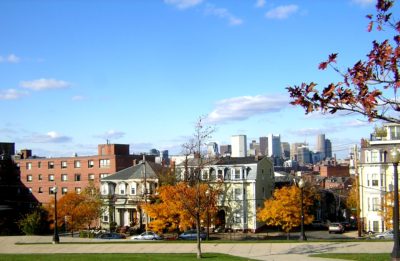
Boston Mayor Martin Walsh announced the beginning of the release of $13 million, which is allocated for affordable housing projects in accordance with the Housing a Changing City: Boston 2030 plan, according to a Thursday press release from Walsh’s office.
The goal is to increase the number of units built for affordable housing annually from 234 to 347, and approximately 6,500 new low-income units total, by the year 2030, according to the release.
Lisa Pollack, a spokesperson for the Boston Department of Neighborhood Development, said the money is coming from a variety of different sources — including the Federal HOME Investment Partnerships Program, Housing Boston 2030, Neighborhood Housing Trust and more — at the federal and state level and then it will be released to construction bids as soon as it is available.
Pollack said Boston is growing faster, and the city is projected to reach approximately 700,000 residents by the year 2030, but that the housing situation in the city is not ready for this kind of population increase.
“Housing stock did not increase quickly enough to meet the growing demands of our growing population so what we need to do now is get a lot of housing into the pipeline, into construction, and opened, to catch up with those demands and then stabilize the market,” Pollack said.
Pollack acknowledged the financial hardships that many residents of Boston are forced to confront.
“Mayor Walsh is incredibly concerned with … making sure that Boston is an equitable and just city,” Pollack said. “The market is so tight right now that it’s pushing up rent.”
Pollack said the new units being built will have set income restrictions in order to preserve the housing for those who are in need of it.
“Boston is doing so well right now [because] we do have a very diverse economy and … we have a diversity of income levels living in the city and we want to hang on to that diversity of income levels,” Pollack said.
Kadineyse Paz, program associate for the Boston Tenant Coalition, said the Boston 2030 plan seems to be targeting middle-income housing more than low-income housing.
“According to the 30 percent margin theory, people should only be spending 30 percent of their income on rent, most spend 50 percent or more,” Paz said. “You always have to beckon the question: affordable to whom? This is also seen in the Boston 2030 plan.”
Paz said the BTC is a grassroots organization made up of homeless advocacy groups, neighborhood groups and community development corporations.
“We operate from a core belief that more affordable housing needs to be both permanent and targeted to Boston’s low-income populations,” Paz said.
Paz said in absence of a cap on rent prices, residents are being moved further from their jobs, schools and transit system due to discriminatory practices.
“Prices are becoming outrageous, discriminatory and continuing to segregate an already segregated city,” Paz said. “There needs to be better housing policy to aid in the continuation of truly affordable housing development.”
Several Boston residents said they question the plan but hope for cheaper rent.
Haley Kittel, 23, of Brighton, said she agrees Boston needs cheaper housing prices but questions the government’s ability to make the project come together.
“The cost of living in Boston is obscene and I think finding a house is like giving someone your arm and your leg,” Kittel said. “It took me three months to find an apartment. I’d love to see it actually work, [but] I have little faith in government spending.”
Kittel said having more affordable housing in the city will help residents improve their community without such income discrimination.
“It’ll kind of create a more welcoming community in the city,” Kittel said. “Especially because we have a pretty big problem with gentrification in this community … It would create a lot more local sort of culture.”
Patrick Dromgoole, 31, of Brighton, said he questions where these new houses will go because of the limited space left for housing in the center of the city.
“Housing is a problem, yes, but I don’t know if building more places to live is going to do anything because I don’t know where you’re going to put them,” Dromgoole said.
Justin Agyemang, 19, of East Boston, said he worries about the upkeep of these houses if they are publicly funded, but that he is aware privately funded housing comes with a price.
“Not a big fan of [city-built houses] because they don’t do a good job,” Agyemang said. “They build good houses and then don’t keep care of it. So, if it’s privately owned it’s fine but the only problem with privately owned is they just up the prices.”
















































































































